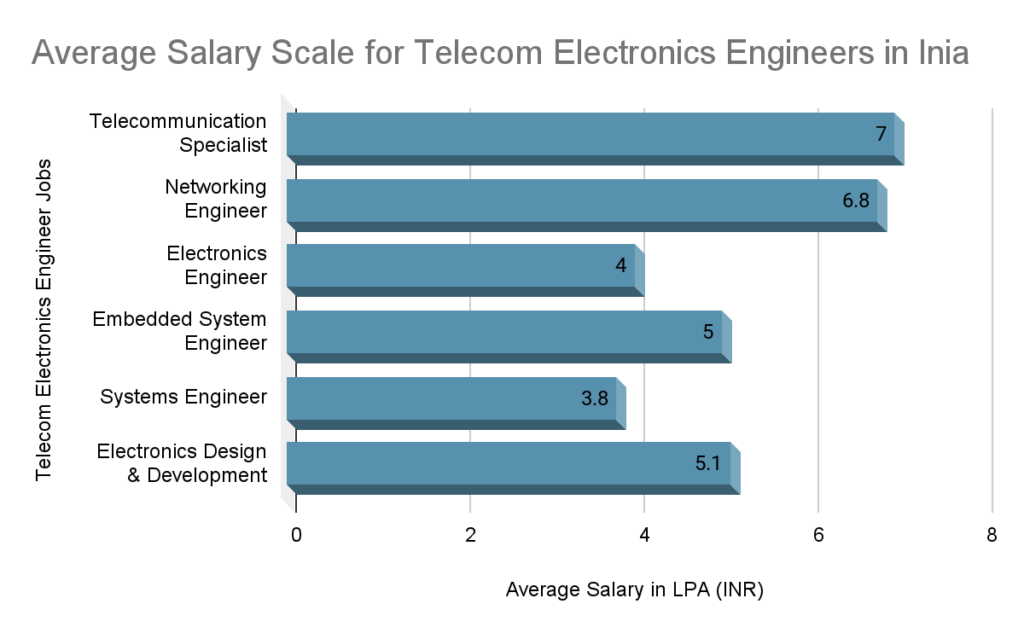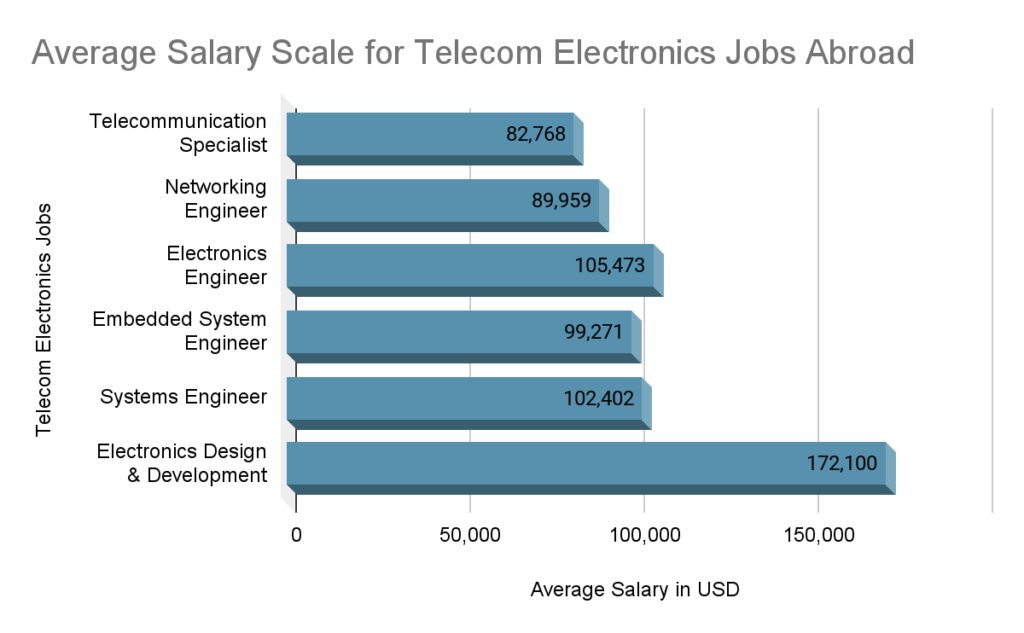Swaying with advancements and technologies, the world today is so empowered by modern versions of all aspects of engineering. This impeccable march forward of technology is supported by various disciplines of engineering and a major one among those is electronics engineering. Any engineering product needs to be constructed with electronics support for automation and thus the electronics engineering market has geared up to a global market value of USD 1,805.61 billion in 2022. Expanding in market size, a career vacuum has been created thus offering great career opportunities for any student completing an electronics engineering course.
So, this article will reveal the career prospects in an electronics engineering course pursued at a top college like ours, Terna Engineering College Nerul.
Table of Contents
ToggleElectronics Engineering Courses at Terna Engineering College Nerul:
Terna Engineering College offers impeccable electronics engineering courses, i.e., BE in Electronics Engineering. This course is specially designed to equip students with an in-depth understanding of electronic facets.
Here are the BE Electronics Engineering course details.
Course Description:
The BE Electronics Engineering Course is focused on educating students on the fundamentals of electronics engineering and imparting knowledge about the various techniques, circuits, methodologies, and tactics in electronics engineering.
Course Level and Duration:
BE Electronics Engineering Course is a 4-year undergraduate course that is being offered in the semester pattern, thus consisting of 8 semesters in total.
Eligibility Criteria:
The eligibility criteria to pursue an electronics engineering course at Terna Engineering College Nerul are as follows:
- Students should have completed 10+2 on any recognized board with a 50% aggregate in physics, chemistry, and mathematics as compulsory subjects.
- Students who have completed a Diploma in Electronics Engineering can opt for lateral entry to a B.Tech degree.
Admission Procedure:
Admission to BTech CSE at our Terna Engineering College Nerul is based on the rules and regulations of the Directorate of Technical Education.
Syllabus:
The BE Electronics Engineering Course syllabus is curated with subjects that impart fundamental knowledge about electronics engineering. Here are the BE Electronics subjects:
First-semester | Second-semester |
Applied Mathematics | Applied Mathematics II |
Applied Physics | Applied Physics II |
Applied Chemistry | Applied Chemistry II |
Mechanics of Engineering | Engineering Drawing Aspects |
Basics of Electrical Engineering | Communication Skills |
Workshop Practice I | Programming Approach |
Third-semester | Fourth-semester |
Applied Mathematics III | Applied Mathematics IV |
Electronics and Circuits | Linear Engineering |
Digital System | Control Systems |
Design Circuit and Networks | Laboratory Design |
Laboratory Digital System | Laboratory Microprocessors |
Fifth-semester | Sixth-semester |
Communication Engineering Laboratory | VLSI Designs |
Microcontrollers and Processing | Instrumentation Systems |
Linear Integrated Circuits | Power Electronics |
Digital Communication | Computer Organisation |
Laboratory Digital Technology | Digital Signal Processing |
Seventh-semester | Eighth-semester |
IC Technology | VLSI Designs Laboratory |
Power Electronics II | Viva-voce |
Elective | – |
Embedded System Design | – |
Project | – |
Electronics Engineering Courses at Terna Engineering College Nerul:
The global telecom electronics communication industry is surging higher and higher day by day with new trends such as IoT, SCADA (Supervisory Control And Data Acquisition), 5G Technology, etc. As a result, the global telecom electronics engineering market size is expected to reach a market value of USD 2524.8 billion by 2029. Here is the proof:

The expanding electronics market has led to the expansion of the scope for career in electronics engineering. Electronic engineering graduates are hired in major numbers in various industries thus offering significant electronics engineering career opportunities.
Let us explore the areas of recruitment, job roles, and top companies that hire electronics engineers in and around the world.
Areas of Recruitment after Electronics Engineering:
Students completing electronics engineering in renowned colleges like ours, Terna Engineering College, Nerul are hired in a wide range of areas for various job roles. Here are the major electronic engineering placement areas:
- Aerospace Industry
- Telecommunication Industry
- Networking Industry
- Electronics Industry
- Defense Sector
- Oil and Gas In the Water Industry
- Embedded Systems Industry
- Geotechnical Industry
Job Roles After Electronics Engineering Course:
Electronics engineering graduates are hired for a wide range of jobs in both the public and private sectors. Thus the jobs in electronics engineering are larger in number and here are some of the job roles after the electronics engineering course:
Job roles for electronics engineers | Job Description |
Telecommunication Specialist | Works on designing, developing, and installing telecommunication facilities and equipment. |
Networking Engineer | Responsible for setting up and maintaining networks within and between organizations. |
Electronics Engineer | Responsible for analyzing, designing, developing, and testing components, devices, systems, etc that allow electricity to pass them such as diodes, capacitors, etc. |
Embedded System Engineer | Responsible for designing, developing, and producing embedded system components. |
Systems Engineer | Systems engineers have to constantly upgrade and maintain electronic data for a company. |
Electronics Design & Development Engineer | The duty of the Electronics Design & Development Engineer is to deeply research, design and develop electrically compatible solutions and products. |
Here is a graph that depicts the salary scale for electronics engineers in India:

The scope in electronics engineering is globally remarkable and many top countries hold demand for skilled electronics engineers and some of the countries are as follows:
- Germany
- US
- Canada
- Switzerland
- United Kingdom
- France
The salary scale for telecom electronics engineers is good abroad and here is the graph for the same:

Job Roles After Electronics Engineering Course:
One of the notable major advantages of electronic engineering is that job placements in top companies and some of them are:
Top Government Companies | Top Private Companies |
|
● ISRO ● Department of Telecommunication ● Bharat Sanchar Nigam Limited (BSNL) ● Indian Railways ● Electronics Corporation of India | ● Reliance Jio ● ACT Fibernet ● TATA Communications ● Airtel ● Vodafone ● Accenture ● Infosys ● Microsoft ● Wipro ● CISCO
|
Conclusion:
Electronics engineering is the powering sector for almost all fields of engineering and so pursuing any electronics engineering course holds great career value in the engineering industry. Students opting for electronics engineering have a wider career scope in the upcoming years as the world’s technologies are constantly evolving.
FAQs:
Yes. Electronics engineering is a good course as it holds a great career scope in India as well as abroad.
The scope of electronics engineering is in various fields such as the aerospace sector, networking sector, communications sector, etc.
Electronics engineering is easier if the student has an interest in physics, circuits, etc., as the major part is dependent on these kinds of subjects.
Electronics engineering subjects include Microprocessors and MicroControllers, VLSI Design, Circuit Design, etc.







